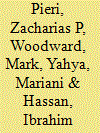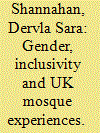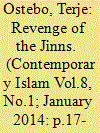|
|
|
Sort Order |
|
|
|
Items / Page
|
|
|
|
|
|
|
| Srl | Item |
| 1 |
ID:
131477


|
|
|
|
|
| Publication |
2014.
|
| Summary/Abstract |
This paper examines the concept of (public) sin as well as efforts to counteract sin from the perspective of Islam. The understanding that hisba, the prohibition of vice and enjoining of virtues, are a responsibility of both the state and the community is common in historical and contemporary Muslim societies. Where the state cannot or does not provide means for countering (public) sin, the perception for some Muslims is that the responsibility on the community and individuals to do so increases. Based on ethnographic research in Britain, Nigeria, Indonesia, Malaysia, and Singapore, the paper highlights examples of how sin has been defined amongst Muslim communities as well as the methods and rationales given to justify the forbidding of sin as a collective and communal public obligation. As the world becomes more integrated, there is growing concern amongst Muslim communities that sin is becoming the norm, leading society to degeneracy, that people who would not have otherwise sinned are influenced to do so. Common features in forbidding sin across Muslim communities have appeared, often focusing on what are seen as moral issues such as dress codes, music, gambling, alcohol, smoking, and the mixing of men and women in public. The forbidding of sin has resulted in attempts to introduce "Shari'a Zones" in some predominantly Muslim areas of London, whilst in Indonesia, this has given rise to the Islamic Defenders Front and in some Northern Nigerian states to the reintroduction of the criminal codes of the Shari'a.
|
|
|
|
|
|
|
|
|
|
|
|
|
|
|
|
| 2 |
ID:
131475


|
|
|
|
|
| Publication |
2014.
|
| Summary/Abstract |
Access to, management and attendance of places of worship often takes gendered forms. Gender imbalances in UK mosques manifests in attendance and management patterns and is reflected in the facilities available. The sense that mosques are perceived widely as 'prayer-clubs for men' (Maqsood 2005: 4-5) is often reflected in the physical spaces and facilities made available to female worshippers, and it must be noted that some mosques do not provide any of the latter at all (Dispatches 2006). Shockingly, a recent survey found that 'women form part of the congregation in [only] half (51%) of the organisations surveyed' (Coleman 2009: 10). Relatedly, UK Mosque management committees privilege male involvement, decision-making and leadership roles, with figures of as few as 15% women in management positions (Asim 2011: 34) and more who 'will simply not entertain the idea' (Asim 2011: 39). Such imbalances reflect the specificities of the UK-religious context (Maqsood 2005) yet, globally, women's mosque involvement appears to be changing far more rapidly than here. This paper explores how gender, religious identity and sexualities interface with women's mosque access, involvement and experiences therein. It draws upon original research with a sample of women, and indicates that inclusivity is an important topic in UK mosques, far beyond gender
|
|
|
|
|
|
|
|
|
|
|
|
|
|
|
|
| 3 |
ID:
131476


|
|
|
|
|
| Publication |
2014.
|
| Summary/Abstract |
The point of departure for this article is a story about jinns taking revenge upon people who have abandoned earlier religious practices. It is a powerful account of their attempt to free themselves from a past viewed as inhabited by evil forces and about the encounter between contemporary Salafi reformism and a presumed disappearing religious universe. It serves to prove how a novel version of Islam has superseded former practices; delegitimized and categorized as belonging to the past. The story is, however, also an important source and an interesting entry-point to examine the continued relevance of past practices within processes of reform. Analyzing the story about the jinns and the trajectory of Salafi reform in Bale, this contribution demonstrates how the past remains intersected with present reformism, and how both former practices and novel impetuses are reconfigured through this process. The article pays attention to the dialectics of negotiations inherent to processes of reform and points to the manner in which the involvement of a range of different actors produces idiosyncratic results. It challenges notions of contemporary Islamic reform as something linear and fixed and argues that such processes are multifaceted and open-ended.
|
|
|
|
|
|
|
|
|
|
|
|
|
|
|
|
| 4 |
ID:
131478


|
|
|
|
|
| Publication |
2014.
|
| Summary/Abstract |
In the first decade or so after the breaking up of the Soviet Union and the independence of the Central Asian states there was an explosion in literature dealing with Islam in the region. Very little of it, however, was based on extensive fieldwork. Furthermore, most of these studies tended to be guided by security and geopolitical concerns and mainly focused on the question of whether there was a risk that militant or radical Islam might gain a foothold in the region. People's everyday religious practice and experiences and their ideas about Islam, on the other hand, were very much neglected.
|
|
|
|
|
|
|
|
|
|
|
|
|
|
|
|
|
|
|
|
|